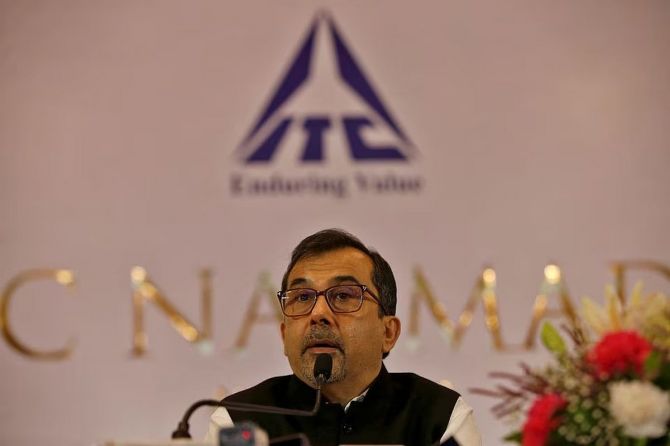Three leading domestic voting advisory firms are not on the same page over the proposed demerger and separate listing of ITC’s hotel business, ITC Hotels.

Institutional Investor Advisory Services (IiAS) has recommended a vote “against” the resolution, while InGovern and Stakeholders Empowerment Services (SES) have advised their clients to vote in favour.
Voting on the resolution is currently underway.
The ITC board gave the green light to the demerger scheme in August 2023.
Under this plan, existing ITC shareholders will receive one share of ITC Hotels for every 10 shares of ITC they own.
After the demerger, ITC shareholders will directly own 60 per cent of the new company, with ITC holding the remaining 40 per cent.
IiAS has raised objections to ITC’s decision to retain a direct 40 per cent stake in ITC Hotels after the demerger.
“While it partially unlocks value (to the extent of 60 per cent), capital support will likely continue to be provided by ITC to the hotels business in its capacity as a promoter.
"The board has not clearly articulated its plan for the 40 per cent holding in the hotels business -- whether it proposes to eventually sell the equity to a strategic buyer or continue to hold it, is unclear,” it said in a note.
The hotel business inherently carries high operating leverage and revenue volatility, which may necessitate capital support from ITC Limited, as its promoter, over the years, it noted.
“Further, there is no clarity on the terms of the brand usage fees between ITC and the hotel business.”
In response to IiAS's recommendation, an ITC spokesperson stated that the company has already addressed the queries raised by the advisory firm.
“As per our understanding, all other proxy advisory firms have recommended voting ‘for’ the demerger resolution,” the spokesperson said.
In a response to IiAS, ITC stated: “To clarify, if ITC does not hold equity stake in the resulting company as proposed, then it will not be possible for the resulting company to, inter alia, use the ‘ITC’ brand name and associated brand equity and goodwill for its hotels operations, which may be detrimental to sustained value creation for its shareholders.”
InGovern’s and SES’s “for” recommendations are largely premised on lack of “red flags” around valuation.
“Since ITC Hotels will have mirror shareholding (60 per cent of ITC) and balance will remain with ITC, the valuation is immaterial at this stage. Further, as ITC Hotels will be listed value will be through a transparent price discovery mechanism. Hence, no concern is identified in this regard,” SES said.
In a note, InGovern said: “Given the clean swap of shares which is beneficial for the minority shareholders, as well as for the growth of both companies.”
Both InGovern and SES, however, have called for more clarity from ITC regarding fees for brand usage.
The company has indicated that these will be based on “industry benchmarking”.
“A simple statement that it will be as per industry benchmark carries no definitive meaning, especially given the fact that Sebi LODR (Listing Obligations and Disclosure Requirements), allows payment of royalty up to 5 per cent without the approval of shareholders,” SES said.
InGovern has also called for more clarity on the terms of commercial arrangements for common assets and shared services, future fund infusion by ITC into the hotel business, and changes in management.
ITC’s NCLT (National Company Law Tribunal) -convened meeting will take place on June 6, following which the company will declare the voting results.
Among the large public shareholders of ITC are state-owned life insurer LIC (15.2 per cent stake), government undertaking SUUTI (7.81 per cent), Myddleton Investment (3.9 per cent), and GQG Partners (1.69 per cent).
It’s not uncommon for voting advisory firms to have divergent views on a particular resolution. Earlier this year, InGovern recommended an “against” vote on Religare Enterprises’ special resolutions around an investment of Rs 15 crore in MIC Insurance Web Aggregator, while IiAS and SES recommended “for” votes.
The resolution was eventually defeated by shareholders.
In October 2023, IiAS recommended an “against” vote on the proposal to appoint Mukesh Ambani’s youngest son, Anant Ambani, to the board of Reliance Industries (RIL), citing his young age. SES and InGovern recommended “for” votes on the resolutions, which were approved by RIL’s shareholders.
Disclaimer: This article is meant for information purposes only. This article and information do not constitute a distribution, an endorsement, an investment advice, an offer to buy or sell or the solicitation of an offer to buy or sell any securities/schemes or any other financial products/investment products mentioned in this article to influence the opinion or behaviour of the investors/recipients.
Any use of the information/any investment and investment related decisions of the investors/recipients are at their sole discretion and risk. Any advice herein is made on a general basis and does not take into account the specific investment objectives of the specific person or group of persons. Opinions expressed herein are subject to change without notice.












 © 2025
© 2025